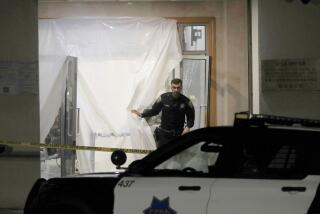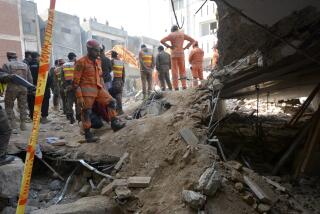Security Measures Served U.S. Consulate Well in Blast
- Share via
WASHINGTON — If there was anything positive to be gleaned from Friday’s explosion outside a U.S. Consulate in Pakistan, it was that the many security measures implemented over the years to protect those working inside the facility appeared to serve their purpose.
The blast in the city of Karachi killed at least 10 Pakistanis in the street outside the fortified consulate and injured scores more. But only five Pakistanis and a U.S. Marine inside the compound received minor injures, despite the fact that 160 Pakistanis and 32 Americans work there.
Reinforcements ordered after the 1998 bombings at the U.S. embassies in Kenya and Tanzania minimized the damage of the blast and probably spared American lives, diplomatic officials said.
“You know, we were very lucky,” State Department spokesman Philip T. Reeker said. “The blast was attenuated by precautions we’ve taken in terms of security steps at our embassies.”
State Department policy forbids disclosure of the security measures taken at specific consulates, but a source with knowledge of the Karachi facility said the building’s outer wall facing the road where Friday’s blast occurred had recently been reinforced.
The windows of the consulate also had a new coating of protective film that helped prevent the glass from shattering and injuring those inside.
The potential for injuries also was reduced because offices on the side of the consulate where the blast occurred were unoccupied and used instead for storage and occasional meetings.
Officials also had beefed up security around the perimeter of the consulate by installing concrete and metal pillars and blast walls, changing public access points and reinforcing a Marine security guard booth.
“I certainly feel that upgrades undertaken in Karachi helped save lives today,” said a U.S. diplomatic security official who requested anonymity.
A team of structural engineers from the United States is due in Karachi early next week to inspect the building, which was temporarily closed Friday, and determine whether it can still be used.
Karachi has long been considered one of the State Department’s more dangerous postings. Anthony Buzzo, who served as a Marine guard at the site in 1995 and 1996, when foreign oil workers and consular employees in the region were slain, described the region Friday as a lawless frontier. He recalled how Americans would invite him and his colleagues to dinner because they felt safer with Marines around.
“There’s always been anti-American sentiment,” said Buzzo, former president of the Marine Embassy Guard Assn. “You get picked out as a target just walking down the street.”
Funding for the security of diplomatic buildings has waxed and waned since a Pentagon report recommended stronger measures in the 1970s but has increased overall since 1998.
Funding for security personnel and operations rose from $409 million in fiscal 2001 to a $553-million request for 2003. Expenditures for the “bricks and mortar” of physical security increased from $662 million in fiscal 2001 to $816 million in 2002.
The money has paid for expanded security perimeters around diplomatic buildings and for new guards. State Department officials have hired 400 local guards and 518 new diplomatic security agents, while hundreds more security personnel have been sent overseas temporarily. New surveillance cameras, chemical equipment and armored cars are among the items that have been bought for embassies since 1998.
U.S. diplomatic sites now have alarms and require vehicle inspections. Other measures include more secure guard booths and barriers to block car bombers. In some cases, local governments have closed streets or moved traffic away from the American buildings. The result is sometimes fortress-like structures with narrow slit windows and massive walls surrounded by barriers.
Diplomatic offices have been relocated to temporary sites in Dar es Salaam, Tanzania; Nairobi, Kenya; and Doha, Qatar. Meanwhile, construction on new buildings is underway in Tanzania, the United Arab Emirates, Kenya, Turkey, Tunisia and Croatia.
Staffing of U.S. offices in Pakistan already had been reduced to emergency levels in March, when the Bush administration warned Americans not to travel to Pakistan.
*
Hendren reported from Washington and Marshall from Karachi.
More to Read
Sign up for Essential California
The most important California stories and recommendations in your inbox every morning.
You may occasionally receive promotional content from the Los Angeles Times.













